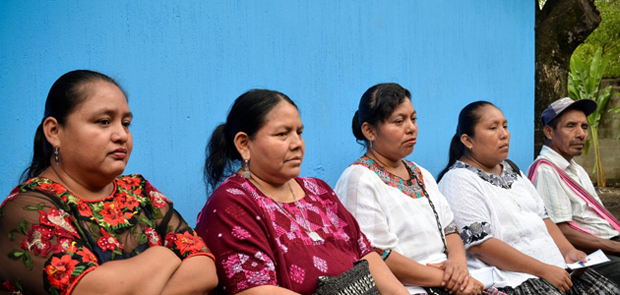
The attitude of these mothers leading the Community Development Council in El Estor, and that of others like them, is helping change the game in areas traditionally dominated by men.
In the late 1800s a British settler set up a general trading store on the banks of the pristine Lake Izabal in the remote eastern part of Guatemala. The shop, being the only supplier of goods for kilometres around, drew a throng of support from the surrounding villages and soon the area around it developed into a prosperous, buzzing town. The settlers referred to the establishment as “the store”, which the Spanish-speaking locals then adapted to “El Estor”.
Nowadays the rural El Estor settlement is one of the poorest in the country and home to many participants in the Mi Bono Seguro programme – a conditional cash-transfer scheme which links cash payments to the provision of education and healthcare. Typically, the conditions required to receive cash payments under such a scheme are that children attend school and that family members receive health check-ups regularly.
Due to the enormous flow of money generated by cash-transfer programmes, Transparency International and some of our local chapters in Latin America are researching ways for all citizens, but especially women beneficiaries, to become critical observers of the programmes so they can detect corruption and promote transparency and accountability.
As the recipient of the cash payment is usually the female adult member of the household, El Estor’s women are ideally placed to take up this role.
Consequently, women in this small rural centre have participated in several workshops organised by our Economic Equality in Latin America (EELA) project through our Guatemalan chapter, Acción Ciudadana.
During these meetings women receive valuable information about the cash-transfer programme, how to fight for cases of inexplicable exclusion from it and how to report the abuse of resources.
“We know what our rights are, we were invited to these training sessions and we attended. Now we stand up, we are not the same as before …” says Marta Perez, president of the Community Development Council (COCODE) at El Estor. It’s encouraging to hear these women talking about their rights – as most of the beneficiaries of the programme tend to consider the cash transfers as some sort of favour from local politicians.
Conditional Cash Transfer programmes have become increasingly prevalent in Latin America over the last 20 years, now reaching more than 100 million people.
These programmes link the concept of social spending with investment in human capital: the transfers are made to alleviate extreme poverty and boost standards in health and education. The premise is that the cycle of poverty through generations is closely linked to a lack of investment in human capital.
Involving communities in search for solutions
Transparency International’s EELA project – which is being carried out in Argentina, Bolivia, Colombia, Honduras, Guatemala, Dominican Republic and Peru – is all about actively involving communities to help analyse the cash-transfer programmes, measure the risks in all phases of fund allocation, and look at how relationships between the main actors in the different tiers of government can affect the integrity of the system.
The EELA strategy is to draw up a detailed analysis of how the cash funds are delivered and clearly map out all the stakeholders, both at the institutional level as well as within oversight bodies.
The most relevant challenge of our field work “is to open a channel of communication with the grassroots organisations, starting with building trust … to diminish fear, pressure or even threats,” says Guatemala’s EELA programme coordinator, Lucia Reyna.
This same methodology of analysis has been able to expose flaws and mismanagement of public resources in the social housing programme in Venezuela, Gran Misión Vivienda Venezuela, as was reported in this blog post.
Women taking the lead in other areas, too
In El Estor, despite inequalities and poverty, there are now women who are playing a leading role in society. They are demanding greater participation in decision-making processes and recognition by local authorities, and also working within the legal system to limit abuse of cash-transfer schemes. For the first time in Izabal, a woman now even chairs a COMUDE –an entity comprising a grouping of different COCODEs.
Through these channels of citizen participation, women are demanding action on issues in the mining and agriculture sectors, drawing attention to citizens´ rights, and even calling for more and better social investment in education, health and food security.
The examples of women taking the lead in communities as vulnerable as El Estor are proof that women’s participation is a vital tool in the fight against corruption – and a way of ensuring greater justice and respect in these societies.
The courage, perseverance and attitude of these women are helping to change the game and in areas traditionally dominated by men.
Carousel image: Copyright, Acción Ciudadana















 Connect with us on Facebook
Connect with us on Facebook Follow us on Twitter
Follow us on Twitter